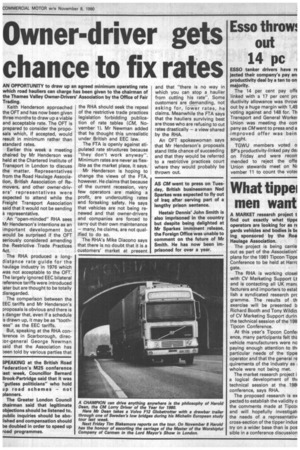Owner-driver gets chance to fix rates
Page 5

If you've noticed an error in this article please click here to report it so we can fix it.
AN OPPORTUNITY to draw up an agreed minimum operating rate which road hauliers can charge has been given to the chairman of the Thames Valley Owner-Drivers' Association by the Office of Fair Trading.
Keith Henderson approached the OFT and has now been given three months to draw up a viable and acceptable rate. The OFT is prepared to consider the proposals which, if accepted, would result in minimum rather than standard rates.
Earlier this week a meeting chaired by Mr Henderson was held at the Chartered Institute of Transport in London to discuss the matter. Representatives from the Road Haulage Association, British Association of Removers, and other owner-drivers' representatives were expected to attend while the Freight Transport Association said that it would not be sending a representative.
An "open-minded" RHA sees Mr Henderson's intentions as an important development but would be surprised if the OFT seriously considered amending the Restrictive Trade Practices Act.
The RHA produced a longdistance rate guide for the haulage industry in 1976 which was not acceptable to the OFT. The largely ignored EEC bilateral reference tariffs were introduced later but are thought to be totally disregarded.
The comparison between the EEC tariffs and Mr Henderson's proposals is obvious and there is 3 danger that, even if a schedule Is drawn up, it may be as "toothess" as the EEC tariffs.
But, speaking at the RHA conference in Scarborough, direc:or-general George Newman 3aid that the Association has aeen told by various parties that the RHA should seek the repeal of the restrictive trade practices legislation forbidding publication of rate tables (CM, November 1). Mr Newman added that he thought this unrealistic under British and EEC law.
The FTA is openly against stipulated rate structures because "they don't work anyway". Minimum rates are never as flexible as the market place, it says.
Mr Henderson is hoping to change the views of the FTA, however. He claims that because of the current recession, very few operators are making a profit, are undercutting rates and forsaking safety. He says that vehicles are not being renewed and that owner-drivers and companies are forced to carry out their own maintenance — many, he claims, are not qualified to do so.
The RHA's Mike Diacono says that there is no doubt that it is a customers' market at present
and that "there is no way in which you can stop a haulier from cutting his rate". Some customers are demanding, not asking for, lower rates, he claims. Meanwhile the FTA says that the hauliers surviving best are those who are refusing to cut rates drastically — a view shared by the RHA.
An OFT spokeswoman says that Mr Henderson's proposals stand little chance of succeeding and that they would be referred to a restrictive practices court where they would probably be thrown out.




















































































































